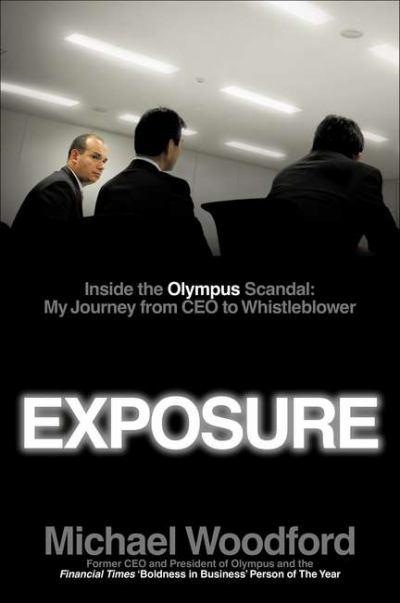Sleepwalking to oblivion
The silence of institutional investors breeds corporate fraud.

"These men committed massive fraud. When the scandal broke, overseas investors spoke up. But domestic institutional investors were silent. They made not one word of criticism of the incumbent board. They gave not one word of support for the person who had exposed the scandal. This dichotomy, between overseas shareholders and domestic shareholders, which in this case were made up of large local banks and insurance companies, that would happen nowhere else in the world."
These are the words of ex-Olympus President and CEO Michael Woodford (click here for the full BBC interview from last week), the man who was sacked last year after thirty years of service because he exposed the $1.7 bn fraud at the Japanese camera and medical equipment company.
It all sounds depressingly familiar to anyone living in Prague today. Start with the Prague Stock Exchange, whose supervisory board chairman, Martin Roman, is himself at the centre of potentially the largest fraud scandal this country has ever seen. Then go on, and try to find a single word of public criticism of the incumbent board of CEZ by its institutional investors -the majority shareholder represented by the finance minister, and the large domestic banks and insurance companies that own the rest of CEZ shares.
The dichotomy of which Woodford speaks may exist here, but we wouldn't know for sure because all foreign investors have pulled out of CEZ. You may argue that the silence of local institutional investors shows that all is well. And you would be wrong. What more do these people need to act to protect the value of their property? At minimum, they need a highly-placed whistle-blower, whose evidence is definitive and inescapable. And even then, as the Woodford case shows, there is no guarantee that they would speak out.
We read in the newspapers today that the Prague Stock Exchange will switch to a new trading system, which its CEO expects to increase trades by foreign investors. One broker responded by saying that those who want to trade in Prague are already doing so. Indeed.
What is required here is tougher compliance. Greater transparency would encourage foreign investors to risk their money here rather than on the Warsaw Stock Exchange, which, I am told, is leagues ahead of Prague in this respect. Switching soft ware is one thing. But when will the board of the Prague Stock Exchange have the balls to switch its heavily compromised chairman?
Woodford described the effects of the unwillingness of institutional investors to expose and condemn corporate fraud committed by their peers as 'sleepwalking to oblivion'.

"These men committed massive fraud. When the scandal broke, overseas investors spoke up. But domestic institutional investors were silent. They made not one word of criticism of the incumbent board. They gave not one word of support for the person who had exposed the scandal. This dichotomy, between overseas shareholders and domestic shareholders, which in this case were made up of large local banks and insurance companies, that would happen nowhere else in the world."
These are the words of ex-Olympus President and CEO Michael Woodford (click here for the full BBC interview from last week), the man who was sacked last year after thirty years of service because he exposed the $1.7 bn fraud at the Japanese camera and medical equipment company.
It all sounds depressingly familiar to anyone living in Prague today. Start with the Prague Stock Exchange, whose supervisory board chairman, Martin Roman, is himself at the centre of potentially the largest fraud scandal this country has ever seen. Then go on, and try to find a single word of public criticism of the incumbent board of CEZ by its institutional investors -the majority shareholder represented by the finance minister, and the large domestic banks and insurance companies that own the rest of CEZ shares.
The dichotomy of which Woodford speaks may exist here, but we wouldn't know for sure because all foreign investors have pulled out of CEZ. You may argue that the silence of local institutional investors shows that all is well. And you would be wrong. What more do these people need to act to protect the value of their property? At minimum, they need a highly-placed whistle-blower, whose evidence is definitive and inescapable. And even then, as the Woodford case shows, there is no guarantee that they would speak out.
We read in the newspapers today that the Prague Stock Exchange will switch to a new trading system, which its CEO expects to increase trades by foreign investors. One broker responded by saying that those who want to trade in Prague are already doing so. Indeed.
What is required here is tougher compliance. Greater transparency would encourage foreign investors to risk their money here rather than on the Warsaw Stock Exchange, which, I am told, is leagues ahead of Prague in this respect. Switching soft ware is one thing. But when will the board of the Prague Stock Exchange have the balls to switch its heavily compromised chairman?
Woodford described the effects of the unwillingness of institutional investors to expose and condemn corporate fraud committed by their peers as 'sleepwalking to oblivion'.

 Miluji cla! Donald Trump a jeho životní láska
Miluji cla! Donald Trump a jeho životní láska Finský prezident má recept na Trumpa. Golfovou diplomacii!
Finský prezident má recept na Trumpa. Golfovou diplomacii! Ukrajinská svatba online: rychlý válečný obřad bez příkras i bez příloh
Ukrajinská svatba online: rychlý válečný obřad bez příkras i bez příloh Z deníku dobrovolníka: Nebezpečná cesta za velitelkou Runou
Z deníku dobrovolníka: Nebezpečná cesta za velitelkou Runou Týden v Česku: Bendova pravda, Babišovo kafe a Pavlovo pózování
Týden v Česku: Bendova pravda, Babišovo kafe a Pavlovo pózování

